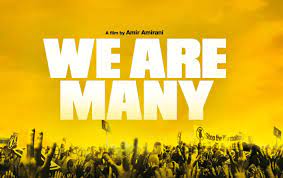
We Are Many is a 2014 film directed by Amir Amirani. It is a documentary chronicalling the activities of the anti-war movement in the UK and US in particular, along with several other nations, as it mobilised with the aim of preventing the so-called “coalition of the willing”, led principally by the US, and followed by the UK, from launching a war in Iraq. As we know, this movement failed in their principal aims. The film’s title is an allusion to the Percy Bysshe Shelley poem “The Masque of Anarchy”, which features the verse: “Rise like lions after slumber, in unvanquishable number – shake your chains to the earth like dew/Which sleep had fallen on you, ye are many – they are few”. We Are Many interviews several subjects involved in the anti-war movement of that period, including Ken Loach, Noam Chomsky, CODEPINK’s Medea Benjamin, Donald Glover, and Tony Benn – in what would be his final appearance on film.
We Are Many emphasizes that the opposition to the war in Iraq, due to the valiant efforts of organisations such as Stop The War Campaign, CODEPINK, Veterans For Peace, and several others – became a worldwide statement from the global masses. It posits that by bringing voices from activists, active politicians, educators, voices within the military community, and the scientific community – who together joined in a global protest on 15th February 2003 involving 30 million people across 72 countries, that the peace movement had become “a new global superpower”, and while it had not been successful in preventing the Iraq War, it had inspired the Arab Spring and Black Lives Matter. When I watched this film, I was annoyed by its conclusions. While I could emphasize with the director finding inspiration in the movement for the anti-government protests in Egypt, I couldn’t ignore that the film highlights the limitations of that movement and every movement said to be inspired by it.
The decision was made to make resistance into a war into a giant march. It’s true that it mobilised a lot of people that wouldn’t be expected to attend a protest, much less an anti-war one (eg. political conservatives, war veterans, etc.). But it only served to highlight that the organisations that worked to bring it together relied on a framework that presupposed liberal democratic assumptions i.e. if the respective governments of those planning the war saw how many people were opposed to the war, they would reconsider the course of action that they took. We saw that public perception was a risk that they found acceptable and went with the war anyway. Bush and Blair were brought back to power the following term. No seat holder representing a political district who voted for the war lost the seat specifically due to the war, which turns the “global superpower” declaration of the peace movement into a farce. The organisations themselves who set it up were convinced that the benificiaries of the war were the arms industries of the respective nations and the oil multinationals. Instead of direct action, which implied a much smaller yet more dedicated groups willing to risk personal safety or freedom, they went for a mass movement drawing a cross-section of people to invoke the “democratic will of people” – unfiltered, unrefined, and full of contradictions. CODEPINK would later rely on the direct action approach to disrupting events attended by Cabinet members of the Bush administration. Andrew Murray himself suggests that had they managed to generate massive strikes, then the war would not have gone ahead. In a lot of respects, it only highlights the significant decline in the strength of organised labour in the advanced capitalist nations since the neoliberal turn.
The film’s assertion that the conditions for a similar mass protest was what stopped the British Parliament from another Middle Eastern war in Syria is suspect when you consider that Both the British and Americans supplied arms to the anti-Assad forces, and the usages of airstrikes by the Trump administration as well as the May government in the UK in Syria. The film unfortunately unintentionally highlights the profound impotence of the anti-war movement – especially in comparison to its relative strength a generation before. I tried explaining this my position on this immediately after viewing it to others, and was met with – at best, an ambiguous reaction. The clips that they used however, were incredibly moving, if nothing else.
We Are Many is a portrait of the passions which fuelled protest in the 2000s, specifically that around the Global North, which led to demonstrations and opposition to the Iraq War. Both the optimism around the strength ofopposition to the war in Iraq, expressed though mass protest, and the severe disappointment as its limitations became apparent.
See also
- Iraq War
- Stop the War Coalition
- CODEPINK
- Fahrenheit 9/11